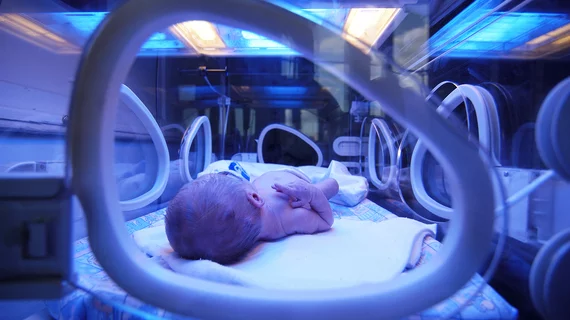Boston hospital installs first MRI system of its kind, says new 7T scanner now available
Brigham and Women’s Hospital (BWH) in Boston made two big imaging-related announcements this week. First, it has installed the first NICU-dedicated MRI system in all of the U.S. Second, its 7T scanner, which generates high-quality images for musculoskeletal and neurological diseases, is now officially available for patients.
BWH's new NICU system is quieter than traditional whole-body scanners and uses lower power consumption.
“The installation of the state-of-the-art, neonatal MRI system will greatly enhance the research capabilities of BWH and elevate and expand neurocritical care for our littlest patients,” Terrie Inder, chair of the Department of Pediatric Newborn Medicine at BWH, said in a prepared statement. “Locating this technology within the NICU will reduce time and patient risk associated with transporting newborns to a traditional MRI and allow MRI access from the first hours of life through the challenging, sometimes life threatening, time within the NICU.”
Scanned newborns will be placed in a temperature-controlled, self-contained incubator bed, which is designed to minimize movement and will allow for continued monitoring of the patient’s vital signs.
Srinivasan Mukundan, Jr., MD, PhD, medical director of Magnetic Resonance Imaging at BWH, said the new system will complement the existing MRI scanners already in use at BWH.
One such system is the hospital's new 7T MRI scanner, which is now approved for use in patients and is fully integrated into the MRI program at BWH.
The 7T scanner provides more than double the strength of a conventional high-field scanner and can generate high-resolution images to offer advanced clinical insights into musculoskeletal conditions that involve cartilage, muscle and fascia of the knee joint and neurological diseases including multiple sclerosis and epilepsy. Using the 7T, BWH researchers identified lesions in 38 percent of epilepsy patient that were not easily apparent on high-quality 3T imaging.
“Our clinical deployment of the new 7T MRI scanner will be a resource for clinicians and researchers across our system, and we look forward to collaborations with our colleagues at MGH,” said Giles Boland, MD, chair of the Department of Radiology at BWH in a prepared statement. “Technical expertise developed over the past decade by MGH researchers working with the first 7T MRI system located at their Charlestown Naval Yard facility will help facilitate clinical translation at BWH. Likewise, clinical advances made at the Brigham will inform research efforts.”

